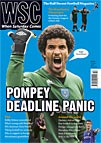 Referees seek respect with the help of the FA's new season guidelines
Referees seek respect with the help of the FA's new season guidelines
Every football season begins with a “clampdown”. Traditionally this involves new FA directives intended to punish foul play accompanied by a healthy dose of moral hysteria about the state of game. On the pitch, referees attempt to implement the new rules, producing a spate of early bookings and a subsequent outcry from managers. Match officials feel the need to loosen their interpretation of the new disciplinary regime a little, often after a meeting with managers at which “robust views” are exchanged. We end up roughly back to how things were before, except that at least one match official will have been maligned in highly personal terms.
The start of 2009-10 has been no different as the FA relaunched a “radical tightening up” of last year’s Respect campaign. While the authorities were keen to trumpet the success of the initiative so far – incidents of “mass confrontation” towards referees are down 46 per cent apparently – there was also new celebrity endorsement. In an online film aimed at parent behaviour, Ray Winstone played two stock roles – a stereotypical referee-abusing geezer father and a creepy Godfather-style character who calls for common sense while watching your children play football.
The main thrust this year, however, was rule changes aimed at the attitudes of managers and players towards referees. The FA warned that managers will face improper conduct charges should they make any adverse comments about referees before or after matches. Clubs will also be charged if three or more players are deemed to have ganged up on the officials.
The News of the World boldly took it upon itself to launch a “nationwide crusade to clean up our soccer”, snappily entitled Shut It!. The paper promised to “name and shame” the worst offenders each Sunday and proclaimed the support of both Fabio Capello and FA chairman Lord Triesman in their “concerted effort to kick dissent out of football”. The campaign has a simple and easily memorised message: “Don’t eff the ref; swear by the rules – not at the officials.”
So far only Roy Keane has found himself in trouble under the latest rule change. The crux of the problem, however, is that match officials are constantly undermined by television’s microscopic scrutiny of football. Decisions that have to be made in a split second are subsequently pored over in slow motion and from every possible angle. Managers are then often given the opportunity to review key incidents while being interviewed immediately after a game. But as the professional game is now funded by television, for better or worse, the football authorities are unlikely to raise complaints against the often overblown and self-serving post-match analysis.
The only way that referees will receive more respectful treatment would be if managers resolved not to talk about officials’ decisions at all directly after a match. But the temptation is likely to be too strong to be curbed by the odd fine.
From WSC 272 October 2009